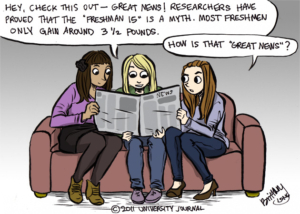The alarming rates of obesity have brought huge attention to trying to find effective treatments for this major public health issue. As you may know, much of the current research here in the DiSH lab investigates the implications of weight stigma on health, as there seem to be widespread misconceptions regarding the causes of obesity, as well as how we can go about solving the crisis.
In a commentary published in the journal Lancet Diabetes and Endocrinology, a group of physicians from the medical faculties of University of Colorado, Northwestern University, and the University of Pennsylvania, challenges the commonly practiced “eat less, move more” treatment for obesity, and states that for people who have stayed obese for more than a few years, this treatment is a prescription for failure.
When thinking about effective treatments for obesity, it is easy to neglect the distinct biological differences in formerly obese people and people who have maintained a normal weight their whole life. The body responds to weight loss with adapted defense mechanisms that are all directed at trying to return to the highest sustained weight. This leads the commonly held “eat less, exercise more” belief to fall short in reality, as previously obese people will constantly be at war with their bodies even long after dieting has stopped.
This disappointing reality is however well known to obesity researchers, and you may wonder why this group of physicians wanted to further bring up the topic?
“It’s not just that most people still stigmatize obesity–as they say, it’s the last acceptable form of stigma,” said Ochner, one of the physicians. “What really bothers me working around and with clinicians, is that some of them–a disturbing percentage–still believe it’s all about personal choice: that if the patient just tries hard enough, and if we can just figure out how to get them a little more motivated, then we’d be successful. And that’s just not right.”
Lifestyle changes are undoubtedly a necessary condition for enduring weight loss, Ochner said. But they’re far from sufficient, and when physicians believe they are–when they say “you already know what to do, I told you what to do,” he said–“that’s certainly cruel, and it’s harmful: It prevents them getting the care they need.”
Physicians should acknowledge the biological challenges of keeping weight off by emphasizing on intervening earlier, and try to prevent overweight people from becoming obese, Orchner states. Additionally, they should recognize FDA approved medications, surgery and device-based treatments as supplemental alternatives. Orchner also emphasizes the need to focus on weight-loss maintenance as a part of obesity treatment, and states that this highly necessary aspect seems to be neglected by most physicians.
In conclusion, the group holds that it is a lack of understanding when it comes to the broader causes and consequences of obesity that prevents many potentially beneficial treatments from being considered and developed, and that this is underlined by a deep-rooted stigma that is even maintained by physicians and other professionals in the field. Read the full article here!


